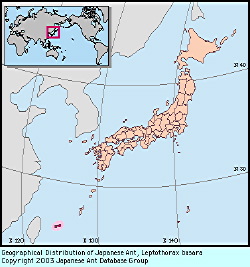
|
species
|
Leptothorax basara
|
 |
Japanese Name
|
Yaeyama-muneboso-ari
|
Original Reference
|
|
Terayama, M. & K. Onoyama (1999) The ant genus Leptothorax Mayr (Hymenoptera; Formicidae) in Japan. Memoirs of the Myrmecological Society of Japan 1: 71-97.
|
Description
|
|
Total length of workers around 2.5 mm. Body color yellow. Antennal scapes reaching posterior margin of head in frontal view. Metanotal groove not incised dorsally. Dorsum of propodeum straight in profile; propodeal spines long and thin. Petiole with relatively long peduncle; node in profile essentially an inverted U-shape; its anterior margin much more steeply sloping than the posterior margin.
|
Remarks
|
|
This species resembles Leptothorax indra, but is distinguished by the absence of rugae on the mesosomal dorsum and the much more steeply sloping anterior margin of the petiolar node.
This species corresponds to Leptothorax sp. B of Onoyama (1976) and Leptothorax sp. 12 in Myrmecological Society of Japan Editorial Committee (1992).
The type material from Iriomote Island was collected from a rotting fallen tree which was partly buried in the ground (Terayama & Onoyama, 1999).
|
|

Distribution
|
|
Ishigaki I., Iriomote I.
|
|
References
|
|
- Terayama, M. & K. Onoyama (1999). The ant genus Leptothorax Mayr (Hymenoptera; Formicidae). Memoris of the Myrmecological Society of Japan 1: 71-97.
- Onoyama, K. (1976). A preliminary study of the ant fauna of Okinawa-Ken, with taxonomic notes. (Japan: Hymenoptera: Formicidae). . Ecol. Stud. Nat. Cons. Ryukyu Isl., 2, 121-141.
- Myrmecological Society of Japan, Editorial Committee (ed.) (1992). A guide for the identification of Japanese ants (III). Myrmicinae and suppliment to Leptanillinae (Hymenoptera: Formicidae). 94pp. The Myrmecological Society of Japan, Tokyo.
|
Editor
|
|
Original text by Mamoru Terayama, Keiichi Onoyama, and Masaaki Morisita. English translation by Mamoru Terayama, edited by Robert W. Taylor.
|
|